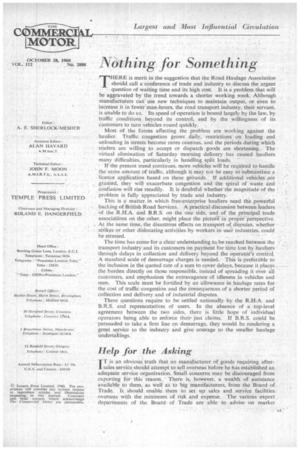()thing for Something
Page 35

If you've noticed an error in this article please click here to report it so we can fix it.
THERE is merit in the suggestion that the Road Haulage Association should call a conference of trade and industry to discuss the urgent question of waiting time and its high cost. It is a.problem that will be aggravated by the trend towards a shorter working week. Although manufacturers can use new techniques to maintain output, or even to increase it in fewer.man-hours, the road transport industry, their servant, is unable to do so. Its speed of operation is bound largely by the law, by traffic conditions beyond its control, and by the willingness of its customers to turn vehicles round quickly.
Most of the forces affecting the problem are working against the haulier. Traffic congestion grows daily, restrictions on loading and unloading in streets become more onerous, and the periods during which traders are willing to accept or dispatch goods are shortening. The virtual elimination of Saturday morning delivery has caused hauliers many difficulties, particularly in handling split loads.
If the present trend continues, more vehicles will be required to handle the same amount of traffic, although it may not be easy to substantiate a licence application based on these grounds.' If additional vehiclesare granted, they will exacerbate congestion and the spiral of waste and confusion will rise steadily. It is doubtful whether the magnitude of the problem is fully appreciated by trade and industry. This is a matter_ in which free-enterprise hauliers need the powerful backing of British Road Services. A practical discussion between leaders • of the-R.H.A. and B.R.S. on the one side, and of the principal trade associations on the other, might place the picture in proper-perspective. , At the same time, the disastrous effects on transport of disputes, whether strikes or other dislocating activities by workers in user industries, could be stressed.
The time has come for a clear, understanding to, be.reached between-the transport industry and its customers on payment for time lost by hauliers through delays in collection and delivery beyond the operator's control. A standard scale of demurrage charges is needed. This is preferable to the inclusion in the quoted rate of a sum to cover delays, because it places the burden directly on those responsible, instead of spreading it 6ver all customers, and emphasizes the extravagance of idleness in vehicles and men. This scale must be fortified by an allowance in haulage rates for the cost of traffic congestion and the consequences of a shorter period of collection and delivery and of industrial disputes.
These questions require to be settled nationally by the R.H:A and B.R.S. and representatives of users. In the absence of a top-level agreement between the two sides, there is little hope of individual operators being able to enforce their. just claims. If B.R.S. could be 'persuaded to take a firm line on demurrage, they would be rendering a great service to the industry and give courage to the smaller haulage undertakings.




















































































































